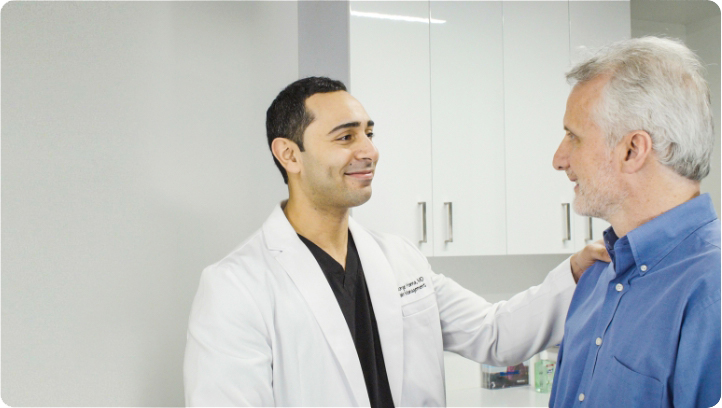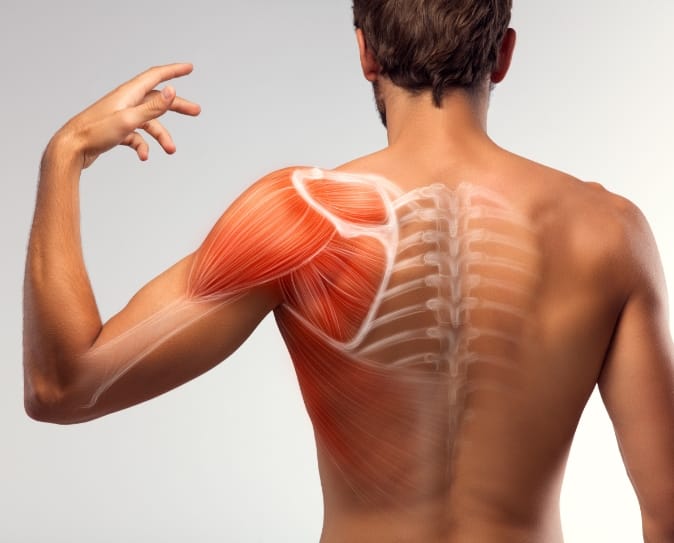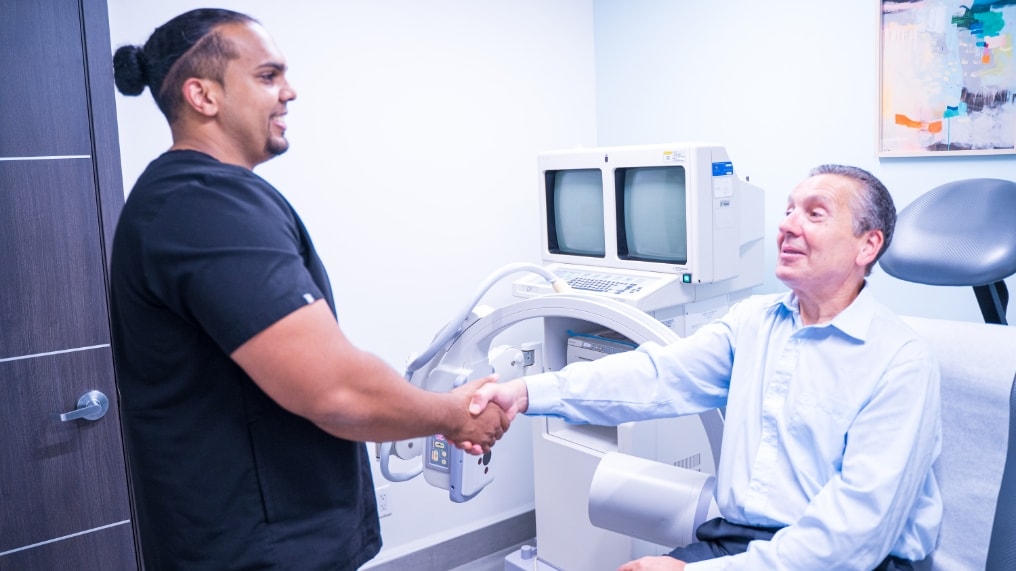What is the Best Shoulder Pain Treatment for you?
A Guide from Expert SHOULDER PAIN Doctors
Shoulder pain treatment has evolved rapidly. We break down the pros and cons of the best shoulder treatments for each type of shoulder pain problem and explain how to find a top and convenient pain treatment center for your shoulder pain
Exploring options for shoulder pain treatment
Our shoulder pain specialists explain non-surgical, convenient options
In this article, our shoulder pain experts discuss the advantages and disadvantages of available pain treatments for shouldr pain to help you decide which treatment may be best for you.




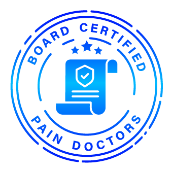

Are you considering getting a Shoulder Pain Treatment done? If so, below is a must-read article. Our Harvard-trained Board Certified pain specialists are nationally recognized. At the Pain Treatment Center, we only focus on the latest procedures that cause minimal discomfort, either during or after treatment. Our doctors help patients avoid surgery. And unlike many pain doctors out there, we don’t just resource to prescribing narcotics because of the risks associated with them, which can lead to severe problems down the line.
Types of Shoulder Pain Treatments


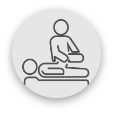

Steroid injections
Also known as: Corticosteroid
Treatment Summary
Camila C
9 weeks ago
Dr. Volney changed my life. I can’t say enough good things about Dr. Volney and his team. Before I met him, I thought I was going to be in pain for the rest of my life, so finally being able to exercise without excruciating pain has been a real game changer for me.

What are Steroid Injections?
Steroid injections are a standard medical treatment used to relieve pain and reduce inflammation in various body parts. Steroids are powerful anti-inflammatory medications that belong to a class of drugs called corticosteroids. They mimic the effects of hormones that your body naturally produces in the adrenal glands.
During a steroid injection, a healthcare provider injects a corticosteroid medication directly into a specific body area, such as a joint, tendon, or bursa sac. These injections are often used to treat arthritis, tendinitis, bursitis, and other inflammatory conditions that cause shoulder pain.
How Does Steroid Injections work?
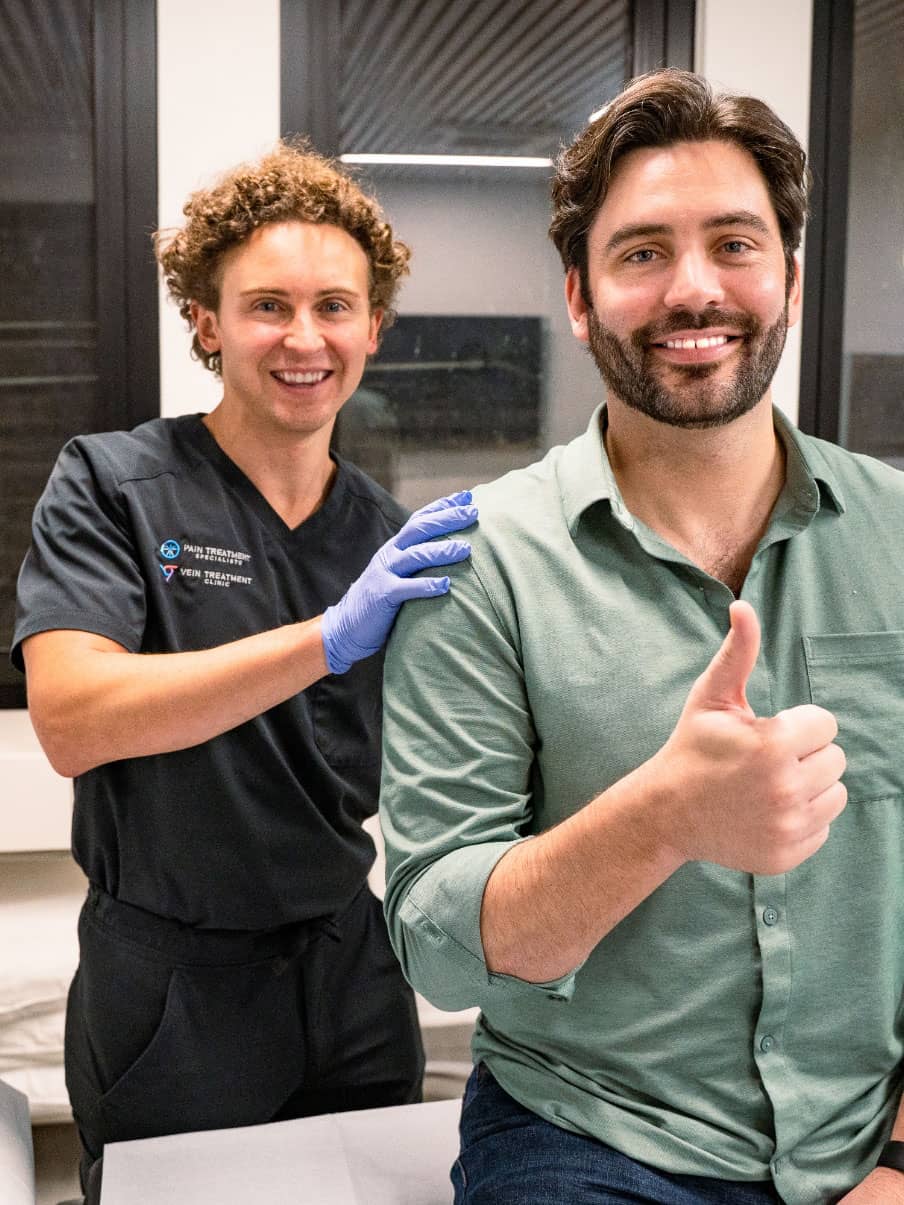
The steroid medication works by suppressing the immune response in the injected area, thereby reducing inflammation and alleviating pain. Steroid injections can provide temporary relief and are particularly helpful for people with conditions that don’t respond well to other treatments, such as oral anti-inflammatory medications or physical therapy.
It’s important to note that while steroid injections can be highly effective in managing pain and inflammation, they are not suitable for everyone and may have potential side effects. Discussing the risks and benefits of steroid injections with a healthcare provider before undergoing the procedure is crucial.
Do you know how to pick a pain treatment specialist for the best results?
Patients respond well to:
Steroid Injections are safe and minimally invasive and can be performed at any appropriately equipped pain treatment clinic
Steroid injections can provide significant pain relief for people suffering from shoulder pain due to conditions like rotator cuff injuries, bursitis, or arthritis. The anti-inflammatory properties of steroids can reduce swelling and alleviate pain.
Many people find the procedure relatively painless.
The injection procedure is relatively quick and can be done in a well-equipped pain treatment clinic. Patients can usually resume their normal activities shortly after the injection.
Steroid injection can also serve as a diagnostic tool. If the injection provides significant pain relief, it can help confirm the source of the pain, aiding in the development of an appropriate treatment plan.
For certain conditions, steroid injections might help patients avoid surgery by managing symptoms effectively.
What To Stay Aware Before Booking A Pain Treatment
Steroid injections offer temporary relief. The pain may return after the effects of the injection wear off.
Steroid injections are not suitable for all types of shoulder pain. They may not be effective for certain conditions, such as advanced arthritis where the joint is severely damaged.
The risk of infection is minimized as the skin is thoroughly cleaned using a sterilizing solution.
Steroid injections can weaken tendons and, in some cases, lead to tendon rupture, especially if injected directly into the tendon.
It is important to have any shoulder injection performed by a specialized pain doctor so that damage does not occur.
Steroid injections are not a long-term solution for chronic shoulder pain
Effectiveness
![]()
![]()
![]()
![]()
![]()
Ease of Insurance Coverage
![]()
![]()
![]()
![]()
![]()
Overall Safety
![]()
![]()
![]()
![]()
![]()
Recovery Time
![]()
![]()
![]()
![]()
![]()

Platelet Rich Plasma Therapy (PRP)
Treatment Summary
James B
9 weeks ago
Searched high and wide for a pain treatment doctor who can help me with my spine pain after surgery from a horse back riding injury and dr Hanna was the only one who was able to subdue the affliction. Personable and friendly, I would recommend him to anyone looking for a high quality medical professional. Amazing!

What is Platelet-Rich Plasma Therapy (PRP) ?
Platelet-Rich Plasma (PRP) therapy is a medical treatment that has gained popularity in recent years for its potential to promote healing and tissue regeneration. In PRP therapy, a small amount of the patient’s blood is drawn and then centrifuged to separate the platelet-rich plasma from the other components of the blood. This concentrated PRP is then injected back into the patient’s body, often at the site of an injury or tissue damage.
PRP contains growth factors and proteins that can help stimulate the healing process. It is commonly used in orthopedic and sports medicine to treat injuries such as tendonitis, ligament sprains, muscle strains, and joint issues. PRP therapy is also used in dermatology for skin rejuvenation and hair loss treatments.

How does PRP Work?
In Platelet-Rich Plasma (PRP) therapy, a small amount of the patient’s blood is drawn and placed in a centrifuge. This machine separates the blood components. The plasma and platelets are isolated from red and white blood cells through centrifugation, creating a concentrated solution. This Platelet-Rich Plasma is then prepared for injection by activating it with substances like calcium chloride, and it is subsequently injected directly into the injured or affected area, such as a joint or tendon.
The injected PRP contains growth factors and proteins that stimulate the body’s natural healing process. These components promote tissue repair and regeneration, encouraging the development of healthy cells and accelerating the healing of damaged areas. Patients may require follow-up treatments based on their response to the therapy. PRP therapy’s effectiveness varies depending on the specific condition treated, the patient’s health, and ongoing research efforts to refine its applications for optimal results. Patients should consult experienced healthcare professionals to determine if PRP therapy suits their needs.
Do you know how to pick a pain treatment specialist for the best results?
Patients respond well to:
PRP therapy uses the patient’s own blood, harnessing the body’s natural healing abilities without the need for foreign substances.
Since PRP is derived from the patient’s own blood, there is a minimal risk of allergic reactions or adverse immune responses.
PRP injections are minimally invasive and are usually performed as outpatient procedures, reducing the risks associated with major surgeries.
PRP injections may help reduce pain and improve shoulder function by promoting tissue repair and reducing inflammation.
Patients often experience a relatively short recovery period compared to surgical interventions, allowing for a quicker return to daily activities.
What To Stay Aware Before Booking A Pain Treatment
The effectiveness of PRP therapy can vary from person to person and condition to condition.
PRP therapy might not be suitable for all types of shoulder pain conditions. A Pain Treatment Specialist will assess the specific condition to determine if PRP is an appropriate treatment option.
It is important to have any PRP injection performed by a specialized pain doctor so that damage does not occur.
While PRP injections are minimally invasive, some patients might experience mild discomfort or pain at the injection site.
Effectiveness
![]()
![]()
![]()
![]()
![]()
Ease of Insurance Coverage
![]()
![]()
![]()
![]()
![]()
Overall Safety
![]()
![]()
![]()
![]()
![]()
Recovery Time
![]()
![]()
![]()
![]()
![]()
NSAIDs
Also known as: Nonsteroidal anti-inflammatory drugs
Treatment Summary
Connie R
9 weeks ago
I’ve enjoyed all of the visits with Dr. Volney, he’s a very caring person.. he listens to you very careful to be able to satisfy your needs. He was very caring and professional with me. He accommodates your needs and attends to them in a very fast matter. The office is always very clean, and I love his assistant Celene. She’s also very polite and knowledgeable. I truly love this team, and they alíviate your pain as well! I would definitely recommend Dr. Volney for all your pain needs!

What are NSAIDs?
Nonsteroidal anti-inflammatory drugs (NSAIDs) are commonly used to alleviate pain and reduce inflammation in various conditions, including shoulder pain.
Individuals with shoulder pain need to consult a Pain Treatment Specialist before starting NSAID treatment, especially if they have underlying health conditions or are taking other medications. A healthcare provider can assess the situation and recommend the most appropriate and safe treatment plan, including NSAIDs, physical therapy, or other medications. Regular monitoring and adherence to recommended dosages are crucial when using NSAIDs for pain management.

How do NSAIDs Work?
NSAIDs work by inhibiting the production of chemicals called prostaglandins. Prostaglandins are substances that promote inflammation, pain, and fever. By blocking these chemicals’ action, NSAIDs help reduce pain and inflammation, making them practical for managing shoulder pain caused by conditions like tendinitis, bursitis, or arthritis.
Do you know how to pick a pain treatment specialist for the best results?
Patients respond well to:
NSAIDs can provide effective relief from mild to moderate shoulder pain, allowing individuals to better manage their discomfort.
NSAIDs help to decrease inflammation in the affected area, which is often a source of pain and discomfort in shoulder conditions.
By reducing pain and inflammation, NSAIDs can improve shoulder mobility and functionality, making it easier for individuals to perform daily activities.
NSAIDs are not addictive.
What To Stay Aware Before Booking A Pain Treatment
NSAIDs can irritate the stomach lining, potentially leading to gastritis, ulcers, or gastrointestinal bleeding, especially with prolonged use or high doses.
Long-term or high-dose use of NSAIDs can increase the risk of heart attack and stroke, especially in individuals with preexisting cardiovascular conditions.
NSAIDs can affect kidney function, which might be a concern for individuals with kidney disease or those taking other medications that impact the kidneys.
NSAIDs can interact with other medications, including blood thinners and certain antihypertensive drugs, potentially leading to complications.
While NSAIDs provide symptom relief, they do not address the underlying cause of shoulder pain. Relying solely on NSAIDs without addressing the root problem might delay proper diagnosis and treatment.
Effectiveness
![]()
![]()
![]()
![]()
![]()
Ease of Insurance Coverage
![]()
![]()
![]()
![]()
![]()
Overall Safety
![]()
![]()
![]()
![]()
![]()
Recovery Time
![]()
![]()
![]()
![]()
![]()

Hyaluronic Acid Injections
Also known as: viscosupplementation
Treatment Summary
David G
9 weeks ago
This is a high end experience. Everyone is very professional and friendly. Beautiful facilities. Dr. Hanna is very brilliant and explains every step of the way. Excellent communication skills. The assistants are awesome, everything about this place is great. I give my highest recommendation to anyone seeking pain treatment.

What is Hyaluronic Acid Injections?
Hyaluronic acid injections, also known as viscosupplementation, are a medical treatment used to relieve joint pain and improve joint function, particularly in conditions like osteoarthritis. Hyaluronic acid is a substance that occurs naturally in the synovial fluid surrounding joints. It acts as a lubricant and shock absorber in the joint spaces, facilitating smooth movement.
In people with osteoarthritis, the natural hyaluronic acid in the joint fluid may break down, leading to reduced lubrication and increased friction between the bones, causing pain and stiffness.

How does Hyaluronic Acid Injections Work?
Hyaluronic acid injections involve injecting a gel-like substance containing hyaluronic acid directly into the joint space. These injections are typically administered in joints such as the knee, hip, or shoulder. The goal of these injections is to supplement the natural hyaluronic acid in the joint, providing better lubrication and cushioning, thus reducing pain and improving joint mobility.
Before the procedure, the patient typically consults a Pain Treatment Specialist, who evaluates the joint condition and determines if hyaluronic acid injections are appropriate. The injections are usually administered in a series, with each injection spaced out over several weeks. The number of injections and the frequency depend on the specific product being used and the individual’s condition.
Do you know how to pick a pain treatment specialist for the best results?
Patients respond well to:
Many patients experience pain relief and improved joint function after hyaluronic acid injections.
The procedure is minimally invasive.
Low Risk of Side Effects: Serious side effects are rare, although minor discomfort or swelling at the injection site can occur.
What To Stay Aware Before Booking A Pain Treatment
The effects of hyaluronic acid injections are usually temporary and may require repeat injections for ongoing pain relief.
While beneficial for some patients, hyaluronic acid injections do not work for everyone, and the degree of effectiveness can vary from person to person.
Your pain specialist will discuss any device limitations with MRI imaging.
Effectiveness
![]()
![]()
![]()
![]()
![]()
Ease of Insurance Coverage
![]()
![]()
![]()
![]()
![]()
Overall Safety
![]()
![]()
![]()
![]()
![]()
Recovery Time
![]()
![]()
![]()
![]()
![]()
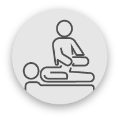
Physical Therapy
Also known as: PT, Therapy
Treatment Summary
David G
9 weeks ago
This is a high end experience. Everyone is very professional and friendly. Beautiful facilities. Dr. Hanna is very brilliant and explains every step of the way. Excellent communication skills. The assistants are awesome, everything about this place is great. I give my highest recommendation to anyone seeking pain treatment.

What is Physical Therapy?
Physical therapy for shoulder pain involves a combination of exercises, stretches, and therapeutic techniques designed to alleviate pain, improve range of motion, and enhance shoulder strength and function. Physical therapists use various methods to address shoulder pain, whether caused by injuries, muscle imbalances, or underlying medical conditions like arthritis.
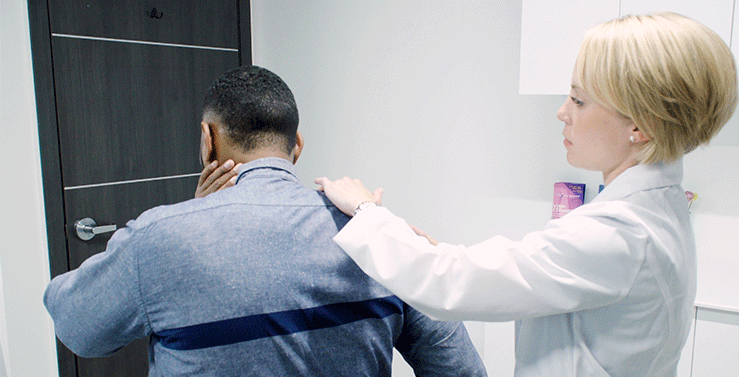
How does Physical Therapy Work?
Through physical therapy you can reduce or eliminate pain. Techniques such as joint and soft tissue mobilization with exercise , or treatments like ultrasound, taping or electrical stimulation can help relieve pain and restore muscle and joint function.
Do you know how to pick a pain treatment specialist for the best results?
Patients respond well to:
Physical therapy can be performed safely in most patients with shoulder pain.
Physical therapy can be used in conjunction with other modalities (lіkе injections or medications).
Physical therapy increases strength and mobility, and often provides long-lasting results.
The focus of your physical therapy program can change over time if your pain changes.
Physical therapy is safe, non-invasive, and works to improve your body’s natural mechanics.
Physical therapy can reduce your need for oral pain medications, which often have side effects.
Once you learn physical therapy exercises, you can safely perform them at home.
What To Stay Aware Before Booking A Pain Treatment
It may take some time to see benefits from physical therapy, as it takes time to develop improved strength, flexibility and balance.
Effectiveness
![]()
![]()
![]()
![]()
![]()
Ease of Insurance Coverage
![]()
![]()
![]()
![]()
![]()
Overall Safety
![]()
![]()
![]()
![]()
![]()
Recovery Time
![]()
![]()
![]()
![]()
![]()

Shoulder Surgery
Also known as: Back Operation, Spine Surgery, Spine Fusion, Discectomy, Laminectomy, Decompression.
Treatment Summary

What Is Shoulder Surgery? (as a last resort)
Shoulder surgery refers to procedures that address various conditions or injuries affecting the shoulder joint, muscles, tendons, ligaments, or bones. Shoulder surgery can be elective, such as in cases of chronic pain or instability, or it can be necessary to treat injuries like fractures or severe tears in tendons or ligaments. Several types of shoulder surgeries are designed to address specific issues.
Shoulder surgery is typically recommended when conservative treatments such as physical therapy, medications, and injections do not provide relief, or when there are severe injuries or structural issues requiring surgical intervention. The specific type of surgery chosen depends on the diagnosis and severity of the condition, as well as the patient’s overall health and lifestyle. Patients should discuss the risks, benefits, and expected outcomes of the surgery with their orthopedic surgeon before making a decision.

How does Shoulder Surgery Work?
Shoulder surgery is a complex medical procedure performed by trained orthopedic surgeons to address various shoulder conditions, injuries, or diseases. The specific steps and techniques involved in shoulder surgery can vary widely depending on the type of surgery being performed, the patient’s diagnosis, and the surgeon’s preferred approach.
It’s important to note that the specific details of shoulder surgery can vary widely based on the patient’s condition and the surgical approach chosen by the surgeon. Patients should have detailed discussions with their healthcare providers to understand the specifics of their surgery and the expected recovery process.
Do you know how to pick a pain treatment specialist for the best results?
Patients respond well to:
Shoulder surgery can be attempted if all other conservative, minimally-invasive treatments, such as injections and physical therapy, fail to yield results.
Shoulder surgery addresses the underlying anatomical issues responsible for back pain.
Surgical procedures can restore range of motion and shoulder function, allowing patients to perform daily activities and tasks without pain or limitations.
What To Stay Aware Before Booking A Pain Treatment
Shoulder surgery is a last resort option if all other solutions fail.
All surgeries carry inherent risks, including infection, bleeding, adverse reactions to anesthesia, and blood clots.
Recovery after shoulder surgery can be lengthy and may involve immobilization, physical therapy, and limitations on activities for an extended period.
Complications such as nerve damage, stiffness, or persistent pain can occur after surgery, impacting the overall outcome.
Some shoulder surgeries might not provide a permanent solution, especially in cases of degenerative conditions like arthritis. Joint replacement surgeries have a lifespan, and revision surgeries might be necessary in the future.
Patients often experience postoperative pain and discomfort, which can be managed with medications but might affect the initial recovery period.
Surgery and the associated pre-operative tests, post-operative care, and physical therapy can be expensive. Insurance coverage may vary, and out-of-pocket costs can be significant.
Depending on the type of surgery, some patients might experience a limited range of motion, especially if extensive tissue manipulation or joint replacement is involved.
Effectiveness
![]()
![]()
![]()
![]()
![]()
Ease of Insurance Coverage
![]()
![]()
![]()
![]()
![]()
Overall Safety
![]()
![]()
![]()
![]()
![]()
Recovery Time
![]()
![]()
![]()
![]()
![]()
Choose a Board Certified Pain Physician
When looking for a pain physician, it is important to select a physician who is qualified and has the appropriate background training. At Pain Treatment Specialists, all of our pain physicians are Board Certified in Pain Medicine and Anesthesiology, meaning that they adhere to the highest medical standards. Board Certification requires extensive specialty-specific training and ongoing education to stay up to date on the most recent advances in pain medicine. All of our Pain Medicine physicians did an advanced fellowship specializing in Pain Medicine at Harvard, to learn the safest, most effective, and most sophisticated techniques to target pain. Our Pain Medicine physicians are spine specialists and see hundreds of patients with neck pain. We take the time to evaluate each patient as an individual, and can help select which treatment modality is most appropriate for your specific pain needs.
What could be the best location option for me?
If you need back pain treatment, or if you are experiencing any neck pain symptoms, we are here to help. Our gold-standard pain centers, staffed by Ivy-league trained pain specialists, are located in New York. Our pain doctors will help you choose the best pain treatment for your unique individual needs.









